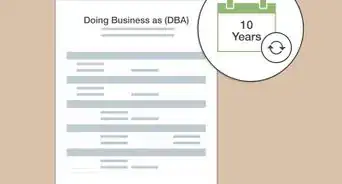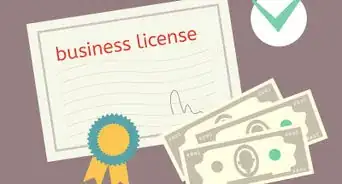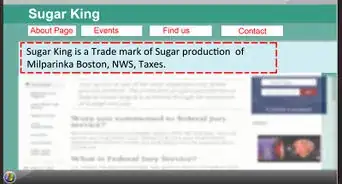This article was co-authored by Clinton M. Sandvick, JD, PhD. Clinton M. Sandvick worked as a civil litigator in California for over 7 years. He received his JD from the University of Wisconsin-Madison in 1998 and his PhD in American History from the University of Oregon in 2013.
wikiHow marks an article as reader-approved once it receives enough positive feedback. In this case, 91% of readers who voted found the article helpful, earning it our reader-approved status.
This article has been viewed 62,022 times.
LLCs are Limited Liability Companies and are a popular way to structure a business. As a registered LLC, you have full corporation status but your taxes are similar to the taxes for a Sole Proprietorship or a Partnership. The state of Virginia has unique LLC requirements that must be followed in order to become a registered LLC. To get the process going, you will first need to name and register your LLC with the State Corporation Commission, and file the necessary forms with the State Corporation Commission.
Steps
Naming and Registering the LLC
-
1Choose a name for your LLC. This is one of the most important steps to registering your LLC. Think of a name that works well with your business venture and is approachable for potential clients. You also want to come up with the name that is easy to search for online, as many of your clients will likely be looking up your business information online.
- The name must also contain the words “Limited Liability Company” or “LLC”. If you use restricted words like “Bank” or “Banque” you will need to complete additional paperwork and/or have a licensed individual like a doctor or an engineer as a member of the LLC. Do not use prohibited words in your LLC name, such as federal or state agency names like FBI, State Treasury, Secret Service, etc.
- You should also do a name search on the Virginia business name database: https://cis.scc.virginia.gov/Account/NameCheckAvailability to confirm the name is not already taken by another business or LLC. You should also confirm the name of your LLC is available as a URL so you can reserve the domain name for your business’s website. Even if you do not make a website right away, you should buy the domain name to prevent other businesses from using it.
-
2Register the LLC name with the State Corporation Commission. File Form SCC631 Application for Reservation or for Renewal of Reservation of a Business Entity Name with the Commonwealth of Virginia State Corporation Commission. This will reserve the name for up to 120 days. You will need to include your LLC name, address, phone number, and signature on the form and send the form in by mail.[1]
- The form can be found on the Virginia SCC website: http://www.scc.virginia.gov/clk/dom_llc.aspx.
- The filing fee for this form is $100.[2]
Advertisement -
3Nominate a Registered Agent for your LLC. The registered agent is a person or business that can receive and send documents on your behalf, such as annual state filings. This person must be a resident of Virginia or a business that is a corporation authorized to conduct business in Virginia. The Registered Agent can be an individual within the company, such as a partner, colleague, or yourself.[3]
- You can also use a registered agent service. There are several benefits to using a registered agent service, as they will be available 9-5 throughout the week to accept important legal documents for you. You can also form an LLC in a state you do not reside in if you use a registered agent service that is located in that state.[4]
- Registered agent services also ensure your privacy by protecting your home address and your personal information from the public record. These services can remind you of any important deadlines or State filings that are due to ensure you are always in compliance with the law and will keep copies of corporate documents in the event you suffer a theft or loss.
Complying with Tax Requirements and Other Regulations
-
1Apply for an Employee Identification Number (EIN) from the IRS. If your LLC contains two or more members, you will need to get an EIN from the IRS so you can do your taxes. An EIN is used to identify your business and acts as a social security number for your company.[5]
- You will need an EIN to open a bank account for the LLC, to file federal and state taxes, and to hire employees.
- You can obtain an EIN from the IRS for free by applying for the EIN online: https://sa.www4.irs.gov/modiein/individual/index.jsp.
- You can also print and mail in the necessary form to obtain an EIN: https://www.irs.gov/pub/irs-pdf/fss4.pdf.
-
2Become familiar with the LLC state and federal tax requirements for Virginia. LLCs in Virginia are subject to certain federal income tax classifications. This will depend on the type of taxation you have set up for your LLC, as you will have different federal tax responsibilities based on your LLC’s taxation plan.[6]
- Talk to your accountant about the Virginia laws on taxation to ensure you are aware of all the taxes your LLC will need to plan for and file. You can also find out more information on state LLC tax registration on the state guide to tax filing requirements for LLCS for Virginia: http://www.nolo.com/legal-encyclopedia/50-state-guide-annual-report-tax-filing-requirements-llcs.
- As an LLC, you will need to register for state taxes if you have employees and you are selling a physical product that requires sales tax within the state of Virginia.
-
3Create an operating agreement with your LLC members. Though LLCs operating in Virginia are not required to have an operating agreement, it is a smart move to create one with the other members of your LLC, especially if your LLC contains more than one member. The LLC operating agreement will be recognized by the state of Virginia as a governing document. It should outline the ownership and operating procedures of your LLC and establish the financial and working relationship between all members of the LLC.[7]
- There are free operating agreement templates available here: http://howtostartanllc.com/learn-the-basics/what-is-an-operating-agreement. But you should get a professional operating agreement drafted by your lawyer and ensure all members of the LLC sign the agreement. A copy of the signed operating agreement should be kept on file by the Registered Agent for your LLC.
Obtaining a Business License and Paying the Annual LLC fee
-
1Determine if you require a business license or permit. This will depend on the type of LLC you are operating, as there are different regulations for different types of business. For example, you may need building permits or zoning permits if your LLC is involved in construction or building. You may also need to obtain a particular business license to ensure you are complying with the federal, state, and local regulations for LLCs. The fees for business permits and licenses will vary depending on the type of licenses you will need to obtain for your LLC.
- Contact your local Commissioner of Revenue or the Department of Finance to determine the business licensing requirements in your area or state. You can also contact the Zoning Office in your area for a list of requirements.
- The U.S. Small Business Administration website has a comprehensive guide on how to obtain the correct licenses and permits for your LLC: https://www.sba.gov/content/what-state-licenses-and-permits-does-your-business-need.
-
2Pay the annual registration fee for LLCs in Virginia. To maintain your LLC status in Virginia, you will need to pay a $50 annual registration fee. You will need to pay the fee to the State Corporation Commission every year on or before the last day of the month in which your LLC was created. If the Commission does not receive the annual fee payment, you will receive a $25 penalty and may lose your LLC status.[8]
- You can pay the annual fee online at the Corporations Commission SCC e-file web page, https://cis.scc.virginia.gov/, or by mail.
-
3Apply for business insurance for your LLC. Once you have formed and registered your LLC, you will need to consider what types of insurance your business requires. If you have employees at your LLC, you will need to apply for Workers Compensation Insurance. This form of insurance is required for most businesses that employ workers and varies from state to state. You can find out more on Virginia’s Workers Compensation Insurance requirements here: http://www.howtostartanllc.com/learn-the-basics/what-is-workers-compensation.
- Most states do not require General Liability Insurance, which protects your business assets and any fees you may need to pay for legal claims against your business. But General Liability Insurance can come in handy in the event of a legal issue or a theft or loss. Consider buying General Liability Insurance for your LLC to protect it.[9]
References
- ↑ http://howtostartanllc.com/virginia-llc
- ↑ https://www.nolo.com/legal-encyclopedia/virginia-form-llc-31855.html
- ↑ http://howtostartanllc.com/virginia-llc
- ↑ http://howtostartanllc.com/learn-the-basics/what-is-a-registered-agent-and-do-you-need-a-registered-agent-service
- ↑ http://howtostartanllc.com/virginia-llc#step1afterfiling
- ↑ https://www.legalzoom.com/articles/virginia-llc-guide
- ↑ https://www.nolo.com/legal-encyclopedia/virginia-form-llc-31855.html
- ↑ https://www.nolo.com/legal-encyclopedia/virginia-form-llc-31855.html
- ↑ http://www.howtostartanllc.com/learn-the-basics/general-liability-insurance











-in-the-USA-Step-20.webp)

















-in-the-USA-Step-20.webp)




































